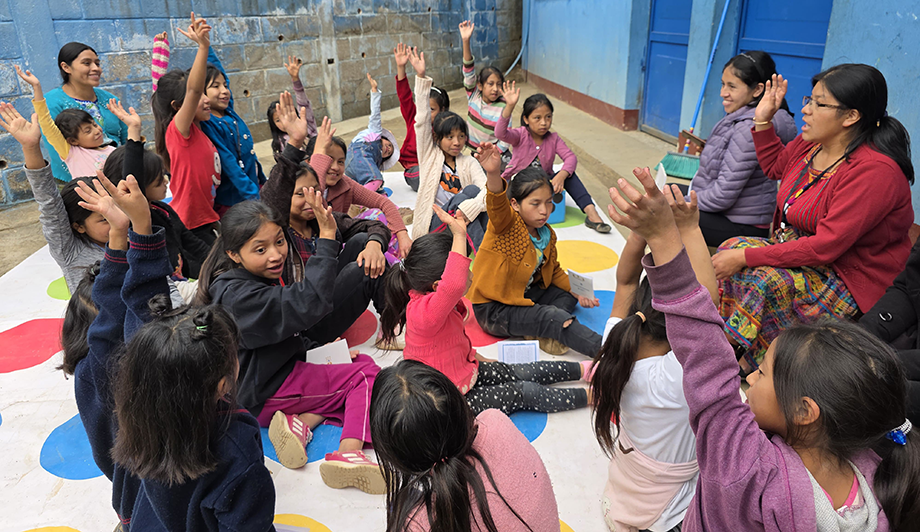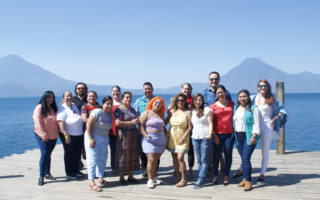
For more than two decades, Abriendo Oportunidades®, has equipped Indigenous girls with critical life skills and support to improve their social, educational, and sexual health outcomes through community-based girls’ groups and Indigenous mentor networks across Guatemala and Mesoamerica.
The Population Council, in collaboration with local and international partners, launched Abriendo Oportunidades® (Opening Opportunities, AO) in Guatemala in 2004. Since then, Abriendo Oportunidades® has reached 25,000 Indigenous girls through our gender transformative social program to support Indigenous girls and young women in Guatemala’s post-war context.
Why it Matters:
Abriendo Oportunidades® was designed to harness the potential of rural, Indigenous girls and young women as mentors and change agents, focusing on growing the social, health, and economic assets and capabilities of rural, Indigenous communities by engaging mentors and adolescent girls as a core strategy for poverty alleviation and long-term social development.
Evidence generated by the Population Council clearly outlined the exclusion that indigenous girls face by analyzing the quadruple disadvantage for Indigenous Guatemalan girls based on age, gender, ethnicity, and geography, which perpetuate intergenerational cycles of negative social, health and economic outcomes.
The intersection of barriers they confront puts them at risk of leaving school at the onset of puberty, marrying early, having children at a young age, and not pursuing secondary education. Providing accessible educational opportunities and support to develop their life skills may delay and even prevent these risks.
Approach:
Following a unique evidence-based, community-anchored, girl-centered (designed with and for girls), cohort-focused, and participatory curricular approach, AO convenes girls and adolescents in safe spaces led by mentors who help them build knowledge and life skills.
What We Are Doing:
- AO increases Indigenous girls’ social support networks, connects them with role models and mentors, builds a base of critical life and leadership skills, and provides hands-on professional training and experience.
- Since 2011, we have cultivated partnerships with the Ministry of Education (MOE) and the General Direction for Alternative Education (DIGEEX) to strengthen flexible academic modalities and improve older Indigenous girls’ educational attainment.
- AO has expanded to cover most Indigenous regions in Guatemala, as well as to Belize as the Toledo Adolescent Girls Program and to Mexico as Abriendo Futuros.
Impacts of Collaborations:
- In 2012 and 2017, former AO mentors established themselves as legal independent organizations with a collective vision to pursue activities aimed at providing gender-transformative experiences for girls and adolescents.
- The Council co-authored the first curriculum guides for the Modalidades Flexibles program (Flexible Modalities) and piloted their implementation. Today we support the promotion and delivery of the program in liaison with AO mentors and MOE’s teachers.
- The AO networks REDMI Aq’ab’al and Na’leb’ak provide a hub for former program mentors to remain connected to one another and offer and receive personal and professional support.
- AO’s mission and previous internship experiences with DEMI inspired a collaboration with the Office of the Vice President in 2021 to create Escuela de Oportunidades (EO), an affirmative action internship initiative to build a pathway to more linguistically and ethnically inclusive public service and continue opening spaces for female Indigenous professionals.
- More than a dozen of interns has been hired in permanent roles in agencies such as the National Secretariat for Science and Technology, Ministry of Labor, Ministry of Social Development, Ministry of Education, and the Secretariat against Sexual Violence, Exploitation, and Human Trafficking (SVET).
The Big Picture:
AO has demonstrated its impact through robust evaluations that show positive reductions in gender-based violence, child marriage, and important gains in education outcomes. By engaging community leaders and collaborating with civil society and government, what began as a program has evolved into a regional social movement.
Our learning partnerships with local governments and organizations strengthen their program planning, implementation, monitoring, and evaluation capacities, helping ensure high-quality programs for vulnerable adolescent girls.
AO Successes:
The following are some key findings from the 2017 CRCT (cluster randomized control trial) comparing outcomes for Indigenous girls ages 12–17 who participated in AO to those who did not in baseline communities:
- Girls in the program had significantly lower chances of experiencing physical violence within their homes compared to those in the control group.
- AO participants were less likely to be married.
- Greater participation in AO is associated with lower chances of ever being married or recently experiencing physical violence.
- Program participation is greater in small rural communities, demonstrating the extent of AO’s reach, and curricular emphasis on critical reflection, emotional regulation, and engagement with indigenous cultural values suggest a reduction in interpersonal violence, mirroring similar studies in North America and Australasia.
- Participation in 50-75% of AO safe space sessions is greatest among girls who are not enrolled in school, while session participation rates of 75% and above were reported solely among girls enrolled in primary school.
- The overwhelming lack of secondary schools in Guatemala hinders AO’s impacts on school attendance and enrollment, which has remained high in primary school for mentors
Girl participants reported that Abriendo Oportunidades® has also helped bring about positive social change in their local households and communities, including:
- Increased autonomy reflected in parental permission for girls to attend AO events.
- Greater freedom to meet with friends outside the home.
- Girls’ improved status within the home and greater participation in school and community activities.
Through the far-reaching legacy of Abriendo Oportunidades®, and the AO mentor-lead networks REDMI Aq’ab’al and Na’leb’ak ONG, the program’s impact in rural communities will be sustained over time.
Partners:
- National Ministries of Labor and Education
- Office of the Vice President
- Office of the Defense of Indigenous Women (DEMI)
- Other partners include nongovernmental organizations, government agencies, civil society organizations, and community leaders.
Funders:
- Summit Foundation
- Tinker Foundation
- NoVo Foundation
- UNFPA
- Rockefeller Brothers Fund
- Jerry and Diane Cunningham
- Wellspring Philanthropic Fund



